Apple’s MacBook lineup has been fully refreshed between the new MacBook Air and 13-inch MacBook Pro with M2 chips arriving this summer and the 14 and 16-inch MacBook Pro landing last fall. And Apple is keeping the M1 MacBook Air in the lineup too. Let’s take an in-depth look at the difference between MacBook Air and Pro to see what sets these MacBooks apart.
Update 6/24: Orders are open for the M2 13-inch MacBook Pro and Apple has also started its Back to School promotion. But we’re still waiting on the M2 MacBook Air to launch which is slated for July.
Read on for why the new M2 MacBook Air is a better choice over the M2 13-inch MacBook Pro, unless the 14 or 16-inch MacBook Pro is a better fit.
Table of contents
The 2021 14 and 16-inch MacBook Pro notebooks feature a fresh design, mini-LED display backlighting, the return of I/O including HDMI, SD card slot, and MagSafe, and the removal of the Touch Bar.
And they have more power than ever with the M1 Pro and M1 Max chips (if you’re on the fence between the 14 and 16-inch MacBook Pro, check out our detailed guide).
Now Apple has unveiled the new 2022 MacBook Air and 13-inch MacBook Pro running on the upgraded M2 chip. The MacBook Air has received the most changes with an all-new design, larger 13.6-inch display, flat-edged chassis, new midnight color, upgraded webcam, and much more.
Difference between MacBook Air and Pro
CPU, GPU, RAM, more
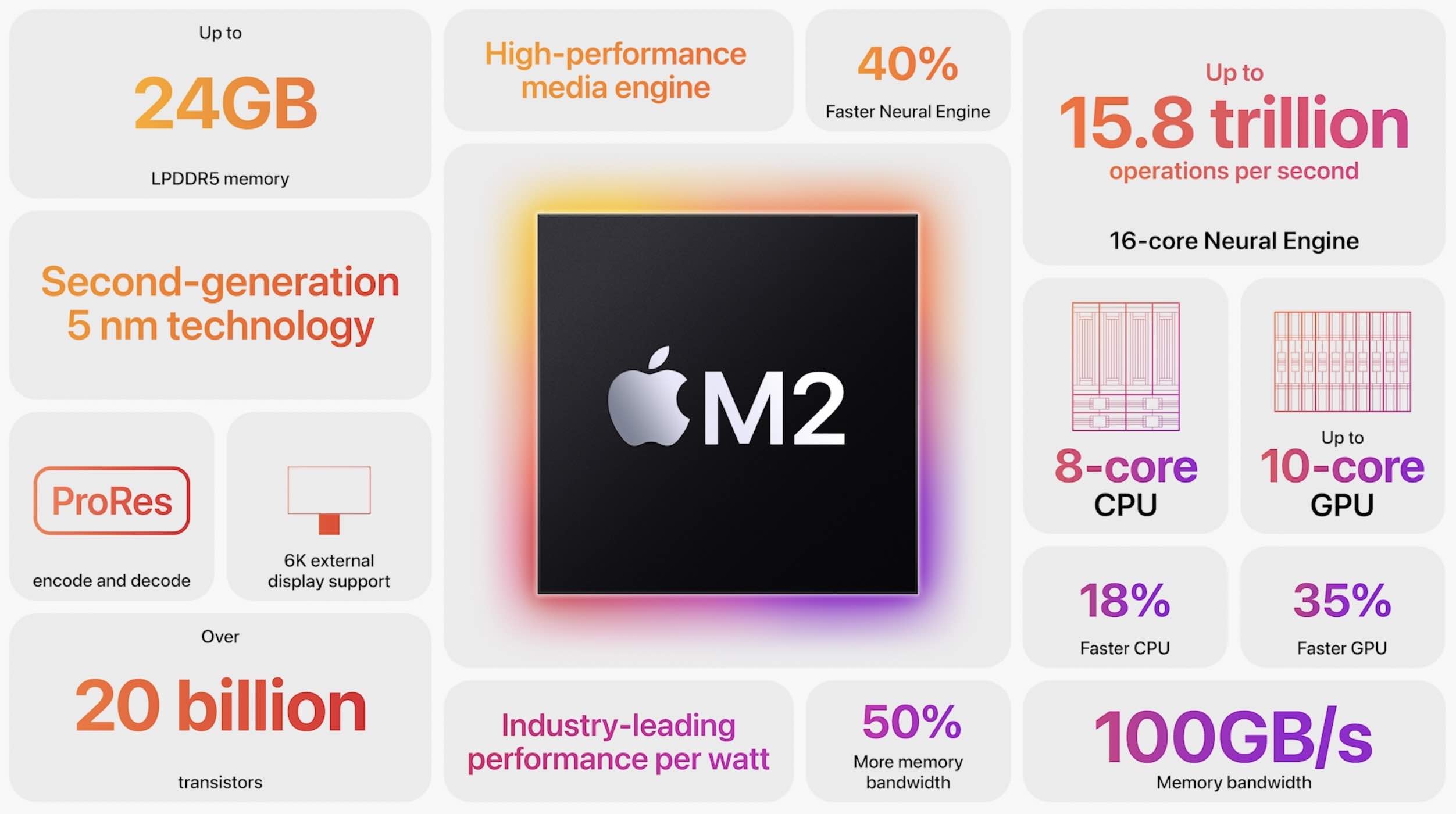
Apple announced its second-generation base Apple Silicon processor with M2. While it’s a notable upgrade over the M1, the M2 is less powerful than the M1 Pro, Max, and Ultra chips.
M2 enables up to 24GB RAM, up to 10 GPU cores, and comes with a faster 8-core CPU than the M1. Here’s a more detailed look at the M1 vs M2 chips.
Meanwhile, with the 14-inch MacBook Pro, you get the M1 Pro or M1 Max chip with the option for even more CPU and GPU cores, and RAM up to 64GB.
| Hardware | 2022 MacBook Air | 2020 MacBook Air | 13″ MacBook Pro (2022) | 14″ MacBook Pro (2021) |
| CPU | M2 – 8-core | M1 – 8-core | M2 – 8-core | M1 Pro or Max – 8 or 10-core |
| Storage | Up to 2TB | Up to 2TB | Up to 2TB | Up to 8TB |
| RAM | 8, 16, or 24GB | 8 or 16GB | 8, 16, or 24GB | 16 to 64GB |
| Graphics | Up to 10-core | 7-core | 10-core | Up to 32-core |
| Neural engine | 16-core | 16-core | 16-core | 16-core |
| FaceTime camera | 1080p | 720p | 720p | 1080p |
| Speakers | 4-speaker system with wide sound | Stereo speakers with wide sound | Stereo speakers with high dynamic range | 6-speaker high-fidelity |
| Mics | 3-mic array | 3-mic array | Studio-quality 3-mic array | Studio-quality 3-mic array |
| Thermal management | Fanless | Fanless | Active cooling with fans | Active cooling with fans |
Apple says the M2 is up to 18% faster for CPU performance and up to 35% faster for GPU performance than the M1. It has over 20 billion transistors and can handle up to 15.8 trillion operations per second.
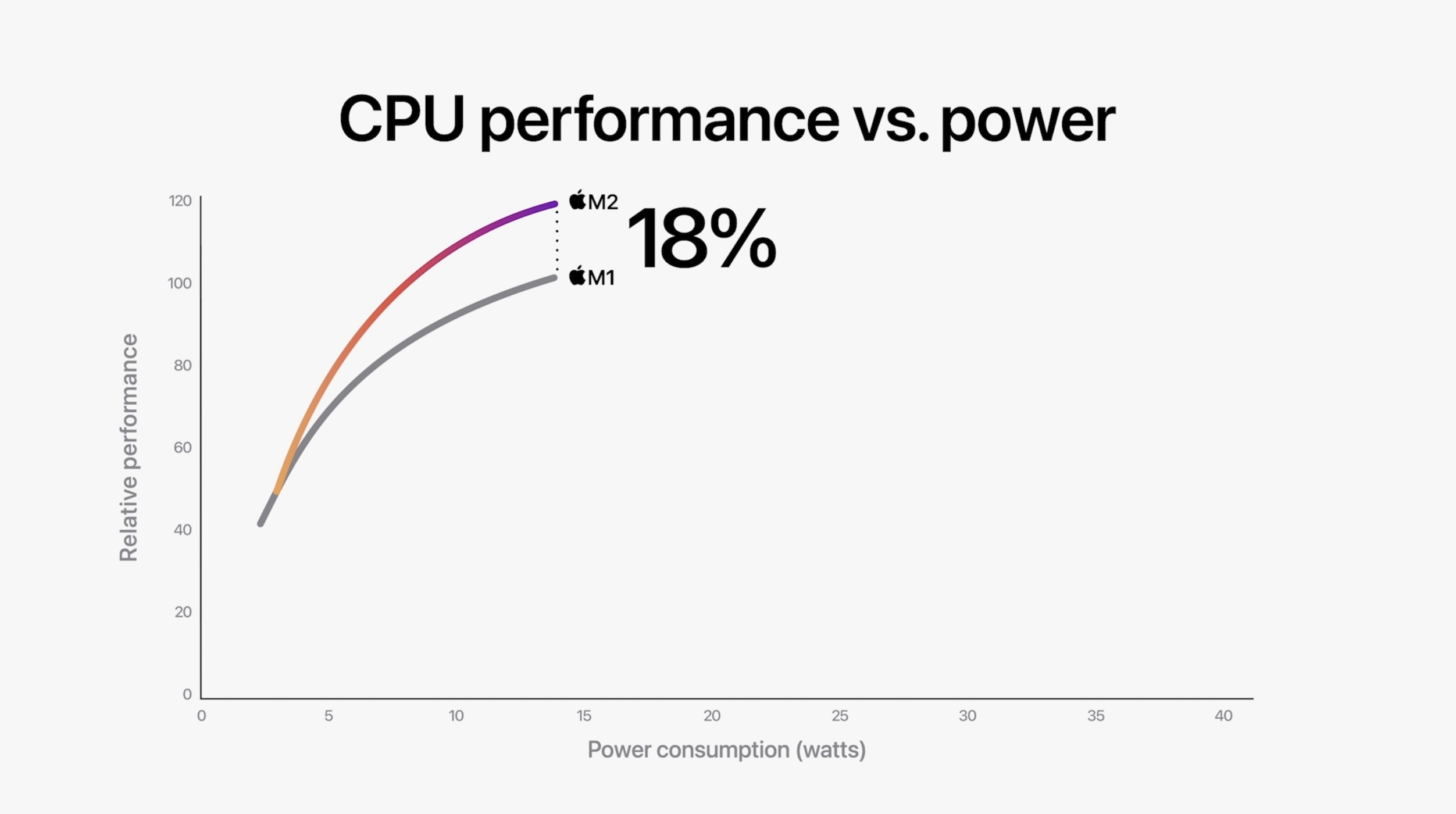
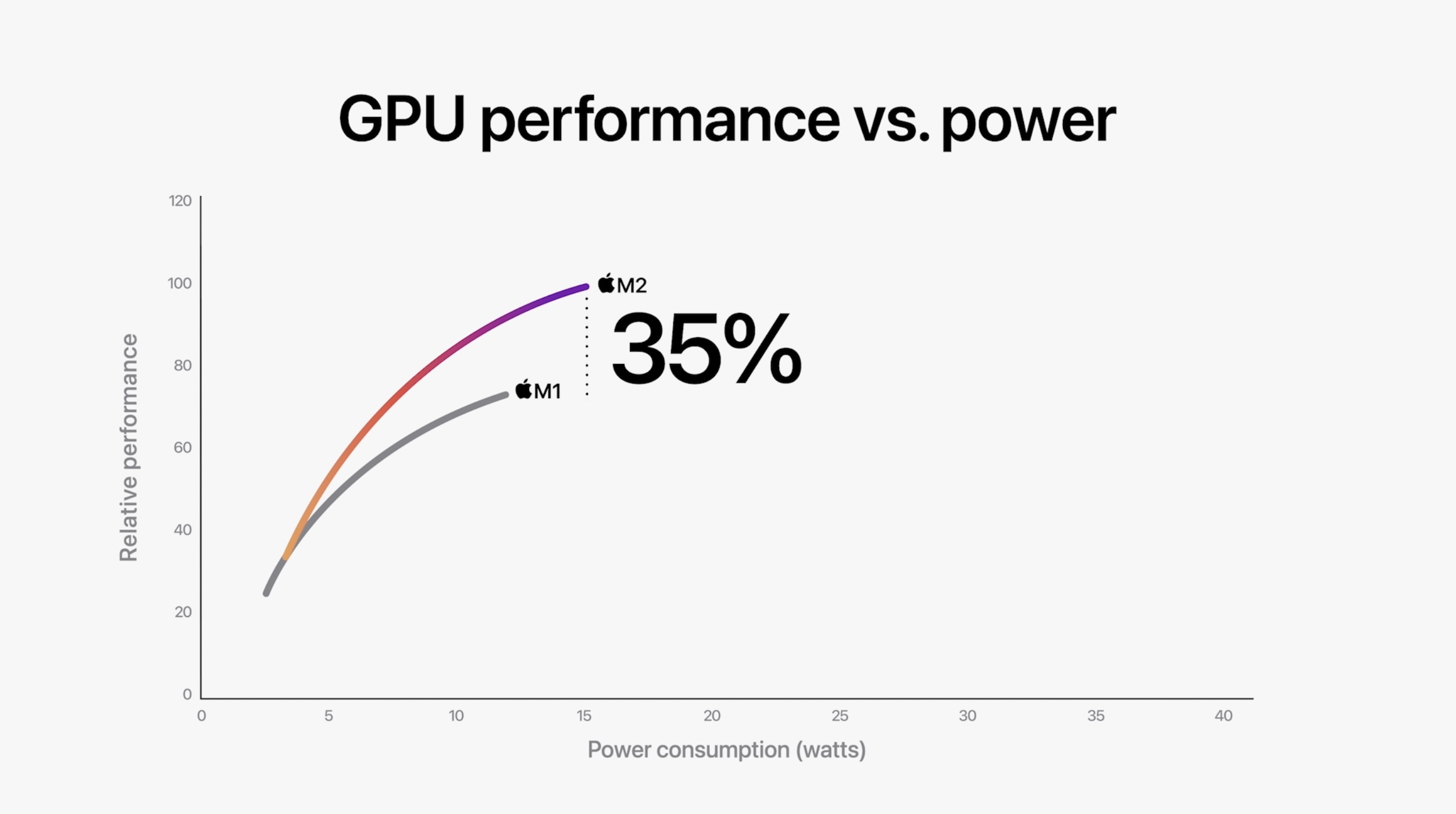
The M2 chip also features a media engine that brings support for hardware-accelerated H.264, HEVC, ProRes, and ProRes RAW. It also has a video and ProRes encode and decode engine.
Another nice addition to the 2022 MacBook Air is a 1080p webcam like the 14-inch MacBook Pro received. Apple says it has the same “advanced image signal processor with computational video.” Meanwhile, the new M2 13-inch MacBook Pro sticks with the old 720p webcam.
Displays
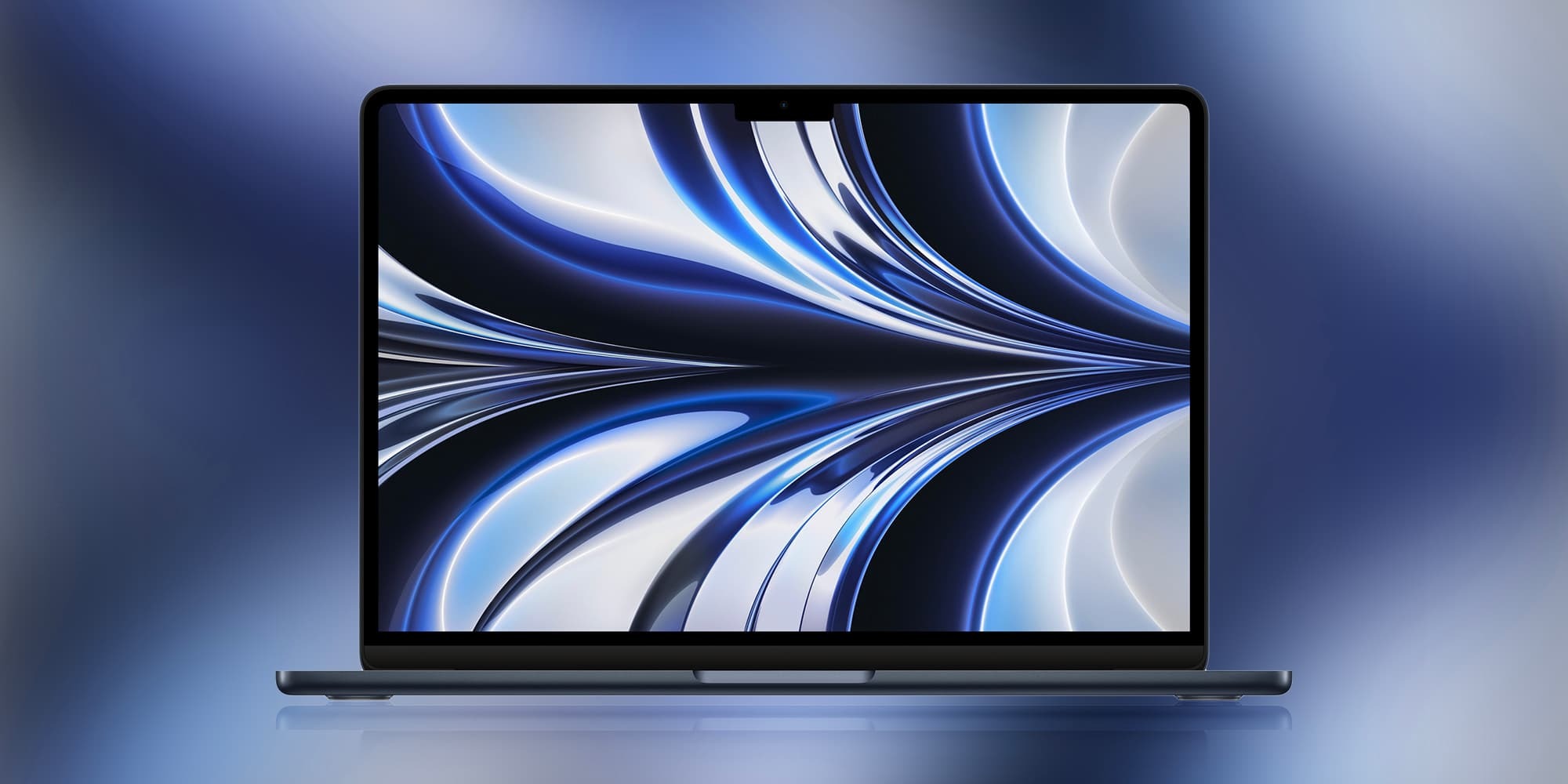
If screen brightness is important to you, the 2022 MacBook Air gets a nice improvement from 400 to 500 nits brightness.
Another change with the redesign is the new MacBook Air has a larger 13.6-inch screen with slimmer bezels.
While the 14-inch MacBook Pro’s up to 1,000 sustained nits brightness (1,600 peak) is just for HDR content, you’re still getting up to 120Hz refresh rates with ProMotion, mini-LED backlighting, and thin bezels.
| 2022 MacBook Air | 2020 MacBook Air | 13″ MacBook Pro (2022) | 14″ MacBook Pro (2021) | |
| Actual screen size | 13.6-inch | 13.3-inch | 13.3-inch | 14.2-inch |
| Resolution | 2560 x 1664 | 2560 x 1600 | 2560 x 1600 | 3024 x 1964 |
| Aspect Ratio | 16:10 + notch | 16:10 | 16:10 | 16:10 + notch |
| PPI | 224 | 227 | 227 | 254 |
| Nits (brightness) | 500 | 400 | 500 | 500 for SDR, 1000 sustained, up to 1600 peak for HDR |
| Retina display | – | ✅ | ✅ | – |
| Liquid Retina Display | ✅ | ❌ | ❌ | ✅ + XDR |
| ProMotion (up to 120Hz) | ❌ | ❌ | ❌ | ✅ |
| mini-LED backlit | ❌ | ❌ | ❌ | ✅ |
| True Tone | ✅ | ✅ | ✅ | ✅ |
| P3 wide color | ✅ | ✅ | ✅ | ✅ |
The new MacBook Air and the 14-inch MacBook Pro include a notch at the top center of the display for the 1080p FaceTime camera. But unlike the iPhone, the notch doesn’t include Face ID hardware/support.
I/O: Difference between MacBook Air and Pro
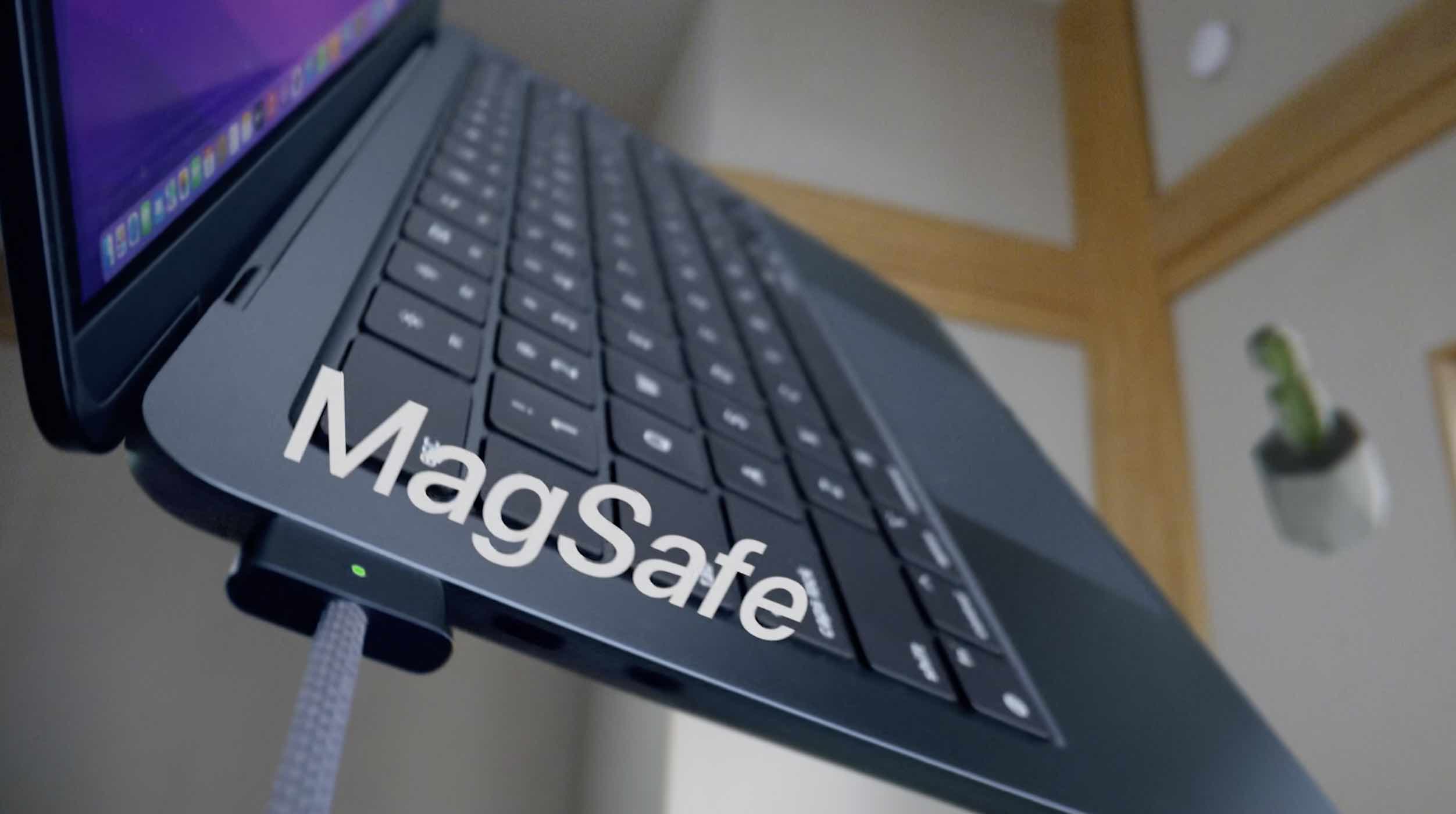
The 2022 MacBook Air gains MagSafe charging like the 2021 MacBook Pro notebooks. However, Apple has kept additions like HDMI, SDXC slot, and support for up to 4 external displays exclusive to the 14 and 16-inch MacBook Pro.
The new 2022 MacBook Air and 13-inch Pro have support for just 1 external display up to 6K at 60Hz, even with the new M2 chip. That may be a deal-breaker for some.
Along with the two USB4/Thunderbolt 3 ports, the new MacBook Air keeps the 3.5 mm headphone jack.
| | 2022 MacBook Air | 2020 MacBook Air | 13″ MacBook Pro (2022) | 14″ MacBook Pro (2021) |
| Magic Keyboard | ✅ | ✅ | ✅ | ✅ |
| Touch ID | ✅ | ✅ | ✅ | ✅ |
| Touch Bar | ❌ | ❌ | ✅ | ❌ |
| USB-C/Thunderbolt ports | 2 | 2 | 2 | 3 |
| Headphone jack | ✅ | ✅ | ✅ | ✅ |
| HDMI | ❌ | ❌ | ❌ | ✅ |
| SDXC card reader | ❌ | ❌ | ❌ | ✅ |
| MagSafe charging | ✅ | ❌ | ❌ | ✅ |
| Bluetooth | 5.0 | 5.0 | 5.0 | 5.0 |
| Wi-Fi | Wi-Fi 6 (802.11.ax) | Wi-Fi 6 (802.11.ax) | Wi-Fi 6 (802.11.ax) | Wi-Fi 6 (802.11.ax) |
| External display support | 1 external display with up to 6K resolution at 60Hz | 1 external display with up to 6K resolution at 60Hz | 1 external display with up to 6K resolution at 60Hz | Up to 2 external displays at 6K res at 60Hz (M1 Pro) or up to 3 external displays at 6K res and 1 external display up to 4K res at 60Hz (M1 Max) |
Size, weight, and finish
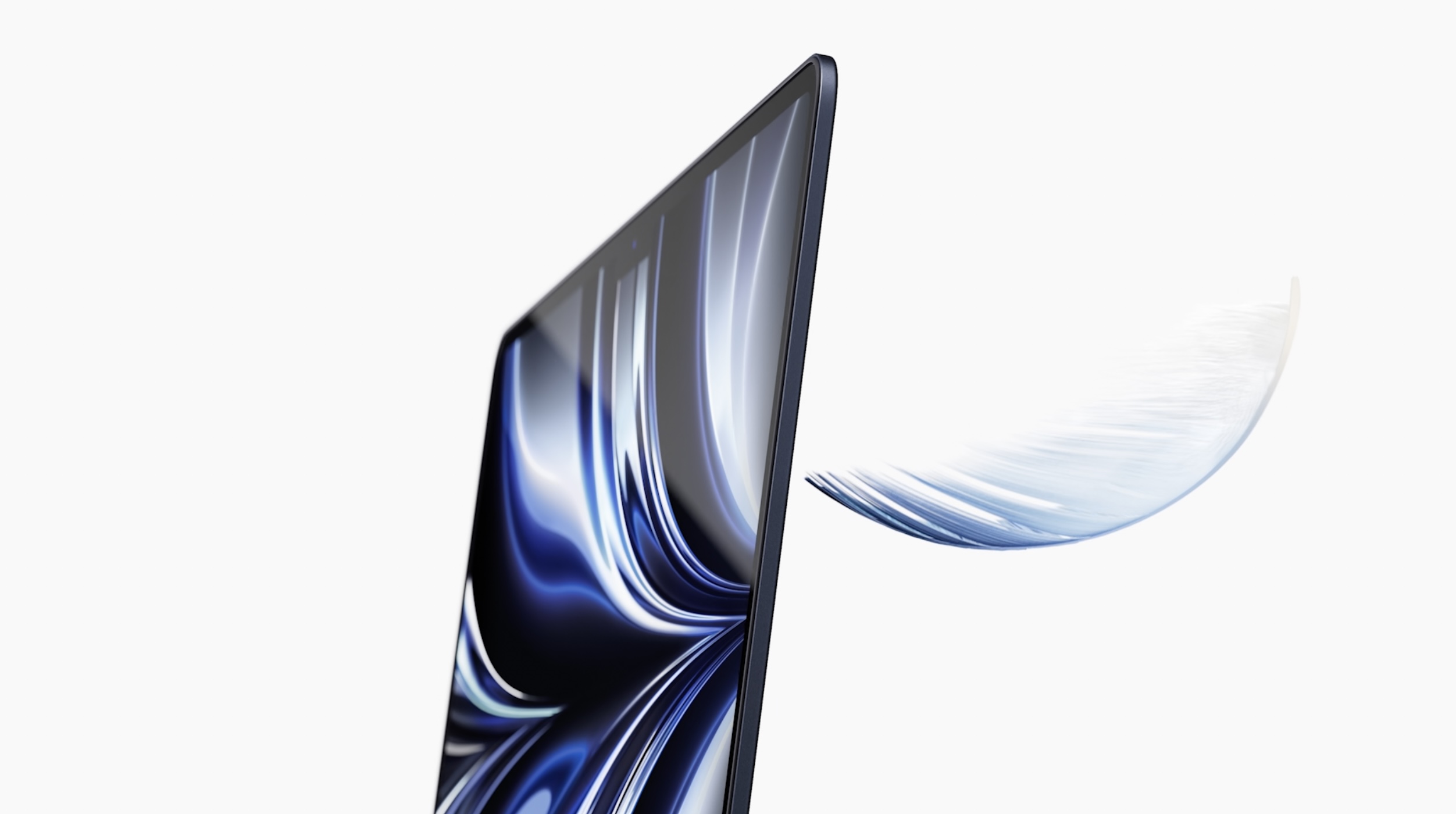
As you’d expect, the MacBook Air remains the lightest machine with the 13-inch MacBook Pro weighing a bit more, and the 14-inch being the heaviest. The new MacBook Air is even 0.1 pounds lighter than its 2020 predecessor.
The new MacBook Air is also super-thin at 11.3 mm (0.44 in). And if the gold or new midnight colors are appealing, those are only available with the MacBook Air.
| 2022 MacBook Air | 2020 MacBook Air | 13″ MacBook Pro (2020) | 14″ MacBook Pro (2021) | |
| Weight | 2.7 pounds (1.24 kg) | 2.8 lbs. (1.29 kg) | 3 pounds (1.4 kg) | 3.5 pounds (1.6 kg) |
| Thickness | 0.44 in. (1.13 cm) | 0.16-0.63 in. (0.41-1.61 cm) | 0.61 inch (1.56 cm) | 0.61 inch (1.55 cm) |
| Width | 11.97 in. (30.41 cm) | 11.97 in. (30.41 cm) | 11.97 in. (30.31 cm) | 12.31 in. (31.26 cm) |
| Depth | 8.46 in. (21.5 cm) | 8.36 in. (21.24 cm) | 8.36 inches (21.24 cm) | 8.71 inches (22.12 cm) |
| Display size | 13.6 in. | 13.3 in. | 13.3 in. | 14.2 in. |
| Finishes | Silver, space gray, starlight, midnight | Silver, space gray, and gold | Silver or space gray | Silver or space gray |
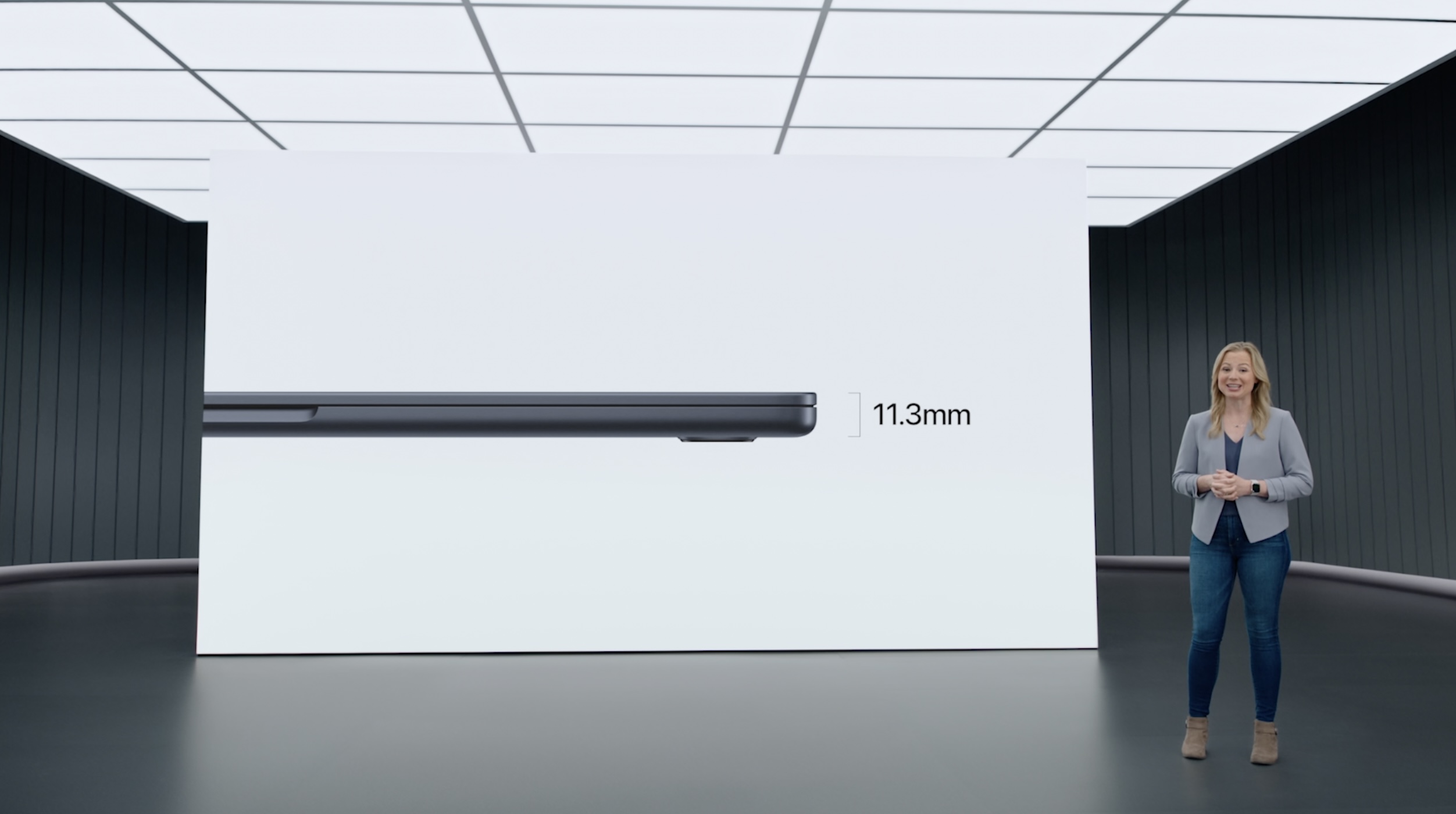
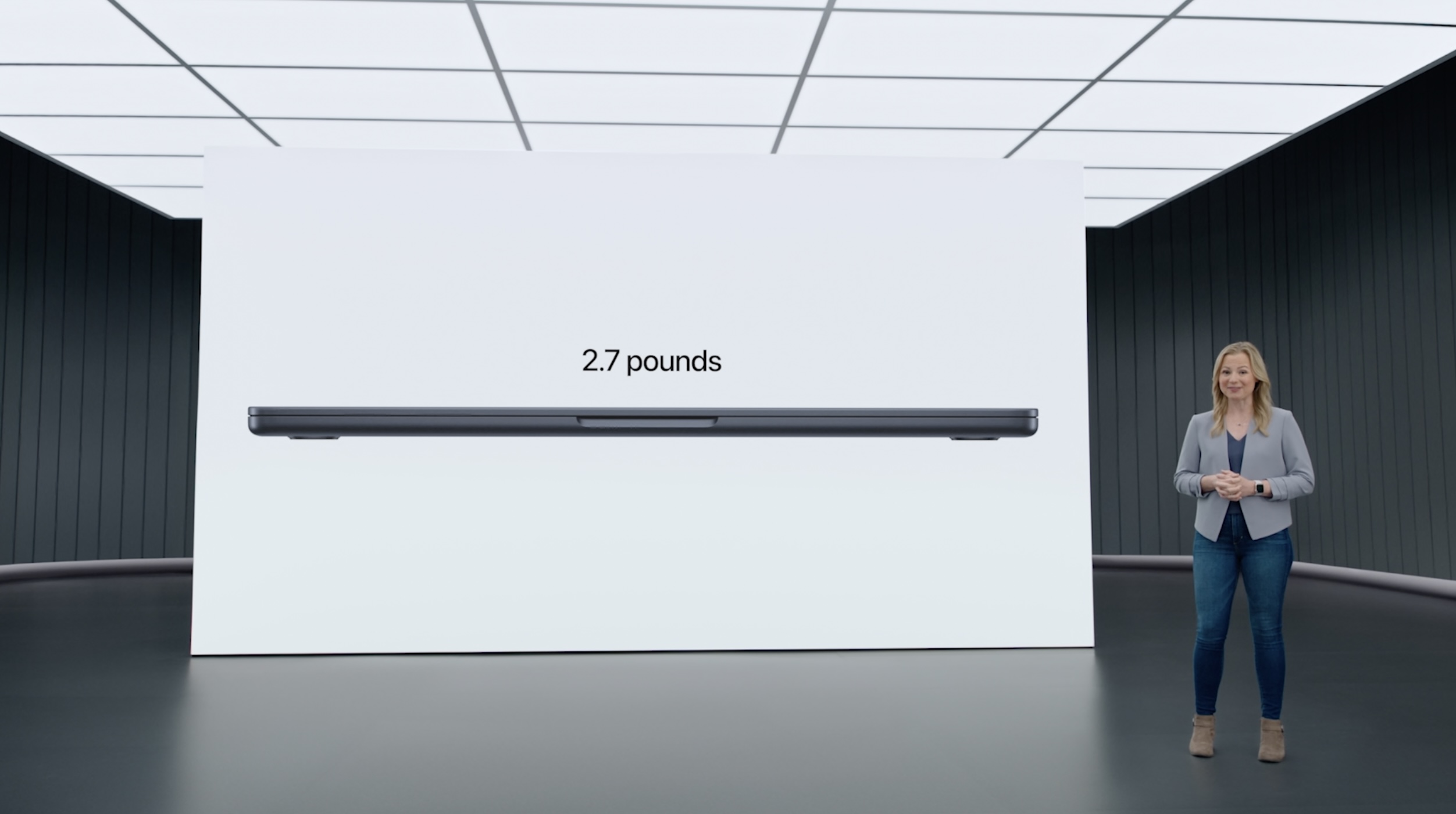
Notably, the new MacBook Air has shifted from the wedge design it’s had for years and now has a flat-edge chassis like the MacBook Pro. But Apple has made it very slim at just 11.3 mm (1.13 cm) thin.
Battery life
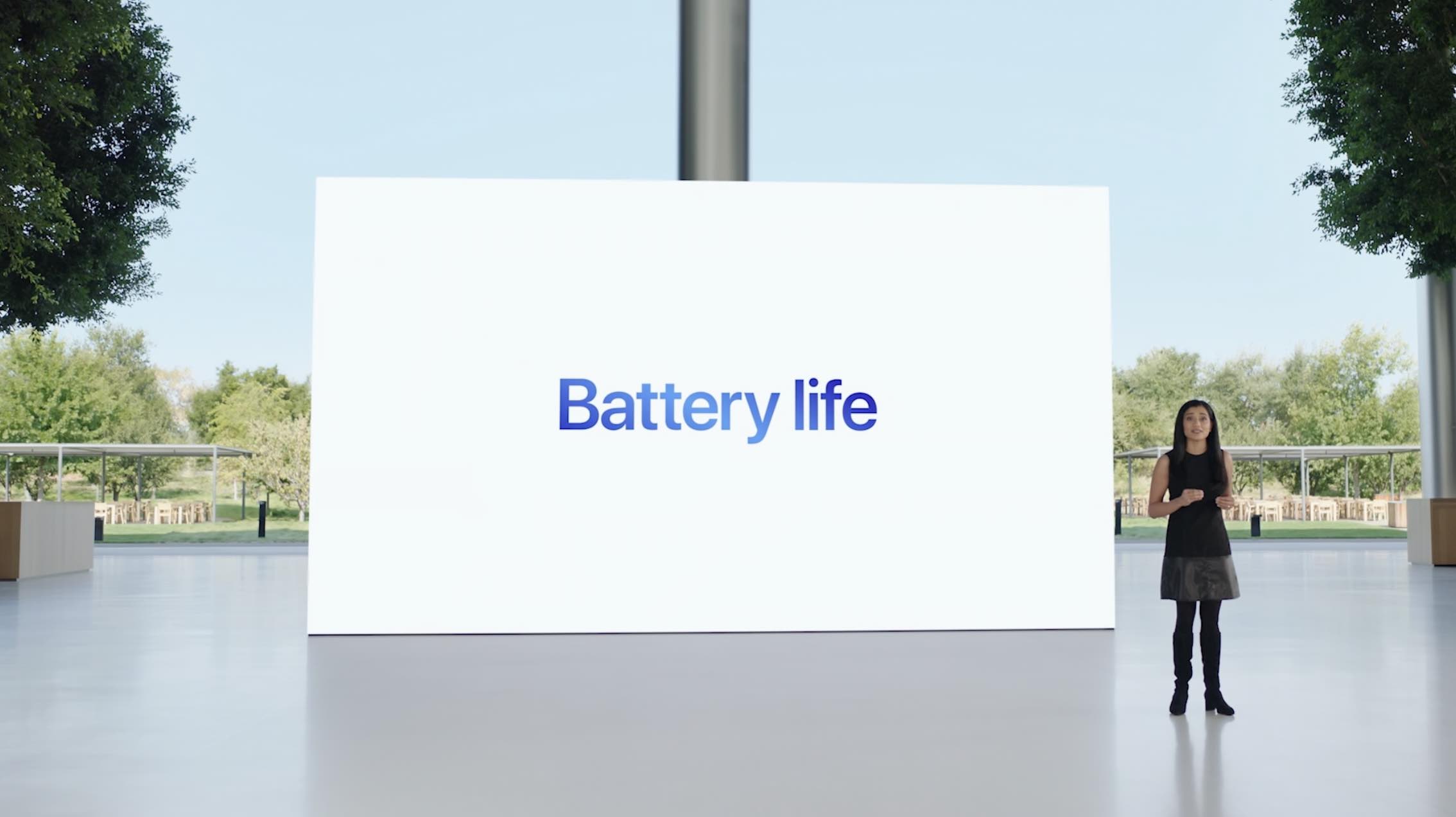
Real-world battery life for Apple Silicon MacBooks compared to the old Intel models has been impressive and usually matches Apple’s claims. But that can depend on what you’re doing with your MacBook, screen brightness, and more.
In any case, the power efficiency and battery life come in strong with the new M2 MacBook Air.
| 2022 MacBook Air | 2020 MacBook Air | 13″ MacBook Pro (2022) | 14″ MacBook Pro (2021) | |
| Wireless web battery | 15 hours | 15 hours | 17 hours | 11 hours |
| Video playback | 18 hours | 18 hours | 20 hours | 17 hours |
| Included power adapter | 30W, 35W, or 67W USB-C + MagSafe | 30W USB-C | 67W USB-C | 67W or 96W USB-C + MagSafe |
| Battery capacity | 52.6Wh | 49.9Wh | 58.2Wh | 70Wh |
| Fast charging | ✅ | ❌ | ❌ | ✅ |
Apple says when using the 67W power adapter, the new MacBook Air can fast charge to give up to 50% battery in just 30 minutes.
Pricing
With a starting price of $1,199, the new MacBook Air comes in $800 less than the 14-inch MacBook Pro which starts at $1,999.
Standard models of the new Air are 256GB SSD/8GB RAM and 512GB SSD/8GB RAM configurations. Models with 16 or 24GB RAM for the 2022 Air and upgraded M2 chip are custom orders.
The 14-inch MacBook Pro base model at $1,999 with an M1 Pro chip, 16GB RAM, and 512GB SSD.
| Model/price | 2022 MacBook Air | 2020 MacBook Air | 13″ MacBook Pro (2020) | 14″ MacBook Pro (2021) |
| 256 / 8GB | $1,199 | $999 | $1,299 | – |
| 512 / 8GB | $1,399 | $1,199 | $1,499 | – |
| 256 / 16GB | $1,399 | $1,199 | $1,499 | – |
| 512 / 16GB | $1,599 | $1,399 | $1,699 | From $1,999 |
| 1TB / 16GB | $1,799 | $1,599 | $1,899 | From $2,199 |
| 1TB/ 24GB | $1,999 | – | – | |
| 1TB / 32GB | – | – | – | From $2,599 |
| Custom builds | Up to $2,499 | Up to $1,999 | Up to $2,299 | Up to $5,899 |
Difference between MacBook Air and Pro conclusion
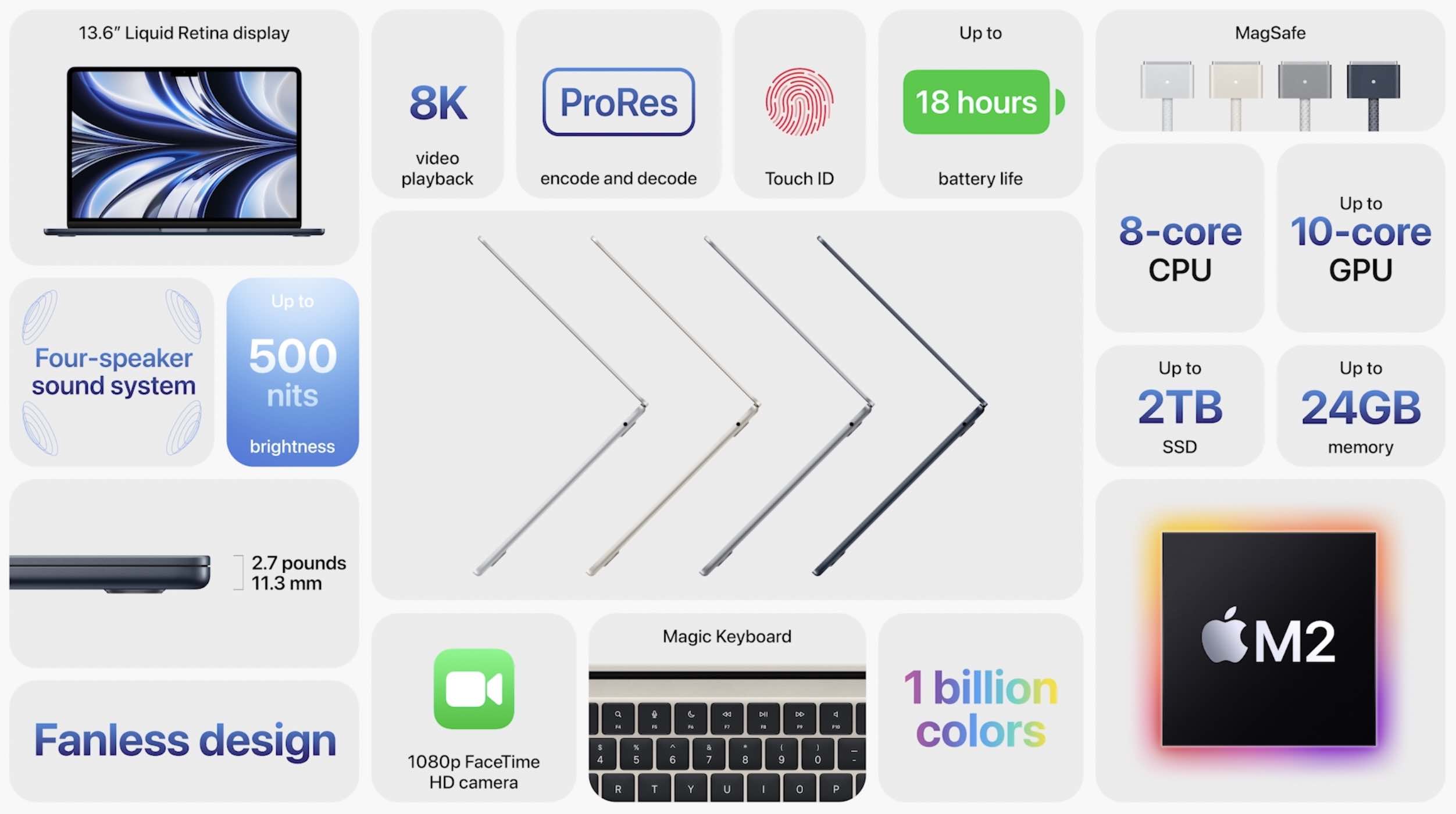
Hopefully, now it’s clear which MacBook is right for you. If you have light to medium performance needs – and even some limited intensive needs, and prefer the lightest machine with great battery life, the MacBook Air is the best fit starting at a reasonable $1,199 or $1,099 for students and teachers.
Apple hasn’t shared exactly when the new MacBook Air will launch other than “July” for now.
For those wanting to save some money and have simple workflows (web, docs, media), the $999 M1 MacBook Air is still in the lineup.
But if you value the most power, active cooling for extended heavy workloads, a brighter screen, more ports, and greater external display support, the 14-inch MacBook Pro is the way to go.
While the 13-inch MacBook Pro has been refreshed with the M2 chip, there probably are not many people that should buy it.
The main difference between the 2022 MacBook Air and Pro is the included fans for the Pro and Touch Bar. But if you’re worried about performance and overheating, you should probably be looking at the 14 or 16-inch MacBook Pro. And the new MacBook Air offers many upgrades that the new 13-inch MacBook Pro doesn’t like the larger Liquid Retina display, 1080p webcam, MagSafe charging, midnight and starlight color options, and more.
Read more 9to5Mac guides:
Check out 9to5Mac on YouTube for more Apple news:
Difference between MacBook Air and Pro: How the redesigned lightweight MacBook stacks up - 9to5Mac
Read More

No comments:
Post a Comment